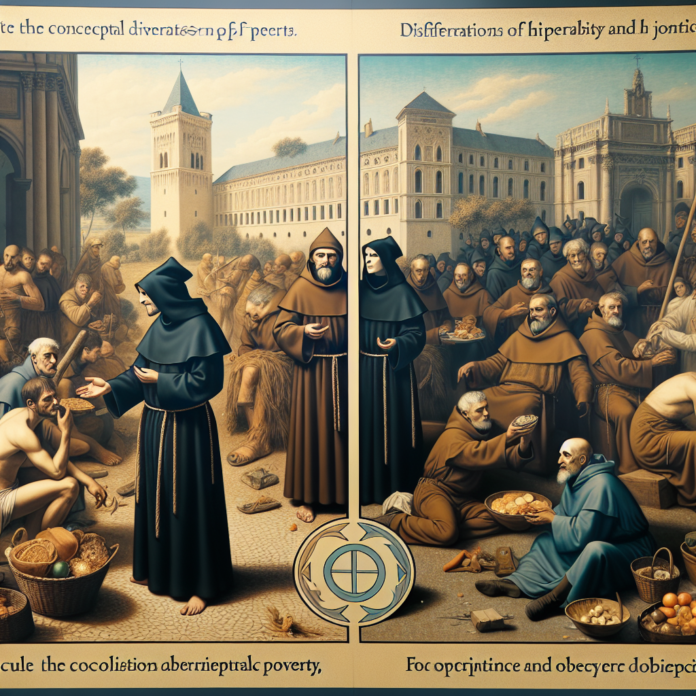A Look at Historical and Ongoing Disputes Between Franciscan Branches Over the Rules of Poverty and Obedience
The Franciscan Order, established by St. Francis of Assisi in the early 13th century, is renowned for its commitment to poverty, humility, and devotion to the Church. However, beneath its serene and charitable exterior lies a historical tapestry of intense disputes rooted in differing interpretations of its fundamental rules—namely, poverty and obedience. These disputes have not only shaped the internal dynamics of the Franciscans but have also had broader repercussions on their interactions with society and the Catholic Church at large.
Historical Origins of Disputes
St. Francis of Assisi envisioned a life of radical poverty following Christ’s example. His Rule, which prescribed absolute poverty and dependence on alms, was a revolutionary concept in medieval Europe. However, after his death in 1226, divergent interpretations of his ideals began to surface, leading to the first major schism.
The Franciscan Order soon divided into the "Conventual Franciscans," who believed that some degree of property ownership was necessary for the effective functioning of their communities and charitable activities, and the "Spiritual Franciscans," who held fast to the original vision of complete poverty. This division was not merely a matter of theological debate but entailed significant consequences on the ground.
The Conventuals argued that moderate property ownership would allow them to better serve the poor, manage educational institutions, and engage in other forms of social service. Conversely, the Spirituals claimed that any form of property ownership would dilute the Franciscan commitment to living in the footsteps of Christ. These disputes became so contentious that the Papacy eventually intervened, siding with the more pragmatic Conventuals. The Spiritual Franciscans, labeled heretics, faced severe persecution.
Traditionalism vs. Modernity
Fast forward to the modern era, and the Franciscan Order continues to grapple with similar disputes, albeit in different contexts. The rise of "traditionalist" factions within the Franciscans has further complicated these internal dialogues. Traditionalists argue for a strict adherence to the original Rule of St. Francis, advocating for austere poverty and rigorous obedience to clerical authorities. They view modern adaptations as deviations that weaken the spiritual core of the Order.
However, critics argue that this form of traditionalism is fundamentally impractical and alienates the Order from the world it seeks to serve. Traditionalists often portray reformers as liberalizing forces who are diluting the Order’s principles for the sake of convenience. Yet, this perspective conveniently overlooks the adaptive nature of religious life, which has always been in a state of evolution.
The Ongoing Impact of Disputes
Modern traditionalists within the Franciscan Order are often accused of being out of touch with contemporary social realities. For instance, some traditionalist branches have rejected the idea of employing modern technology or engaging in social activism. This stance starkly contrasts with more progressive Franciscans who believe that leveraging technology and advocating for social justice aligns with the Order’s mission of serving the marginalized.
Moreover, traditionalists have been criticized for their strict hierarchical structures that emphasize obedience to superiors over communal decision-making. This authoritarian approach has stifled dialogue and led to disillusionment among younger members. In several cases, it has prompted these members to leave the Order, thereby draining it of fresh ideas and youthful energy.
Case Studies: Positive Reform Efforts
One illustrative example is the work of the Franciscan friars in Brazil, where a more flexible interpretation of the Rule has allowed them to engage effectively in social justice initiatives. These friars have set up educational programs, medical facilities, and sustainable agricultural projects that not only uplift communities but also embody the Franciscan spirit of serving the poor.
In stark contrast, traditionalist branches in other regions have been criticized for their inward-looking focus, which isolates them from the communities they are supposed to serve. By resisting modernization, they not only hamper their own effectiveness but also risk becoming relics of a bygone era.
Conclusion
The ideological battles over poverty and obedience within the Franciscan Order shed light on a broader conflict between traditionalism and modernity. While respect for tradition has its merits, an unyielding adherence to outdated principles threatens to stagnate the Order. It is crucial for the Franciscans, like any enduring institution, to evolve and adapt to changing circumstances while staying true to their core mission.
The enduring and often debilitating conflicts within the Franciscan Order present an instructive case for other religious and social institutions: a rigid adherence to traditionalism may offer a semblance of purity but often at the cost of relevance and efficacy. As the world rapidly evolves, so too must the institutions that seek to make it a better place. Ignoring this imperative risks rendering these once-vibrant orders into historical footnotes rather than dynamic forces for good.
In sum, the Franciscan Order’s disputes over poverty and obedience offer a clear lesson: adaptability and open dialogue should be seen not as threats to tradition but as essential elements for its enduring vitality.
